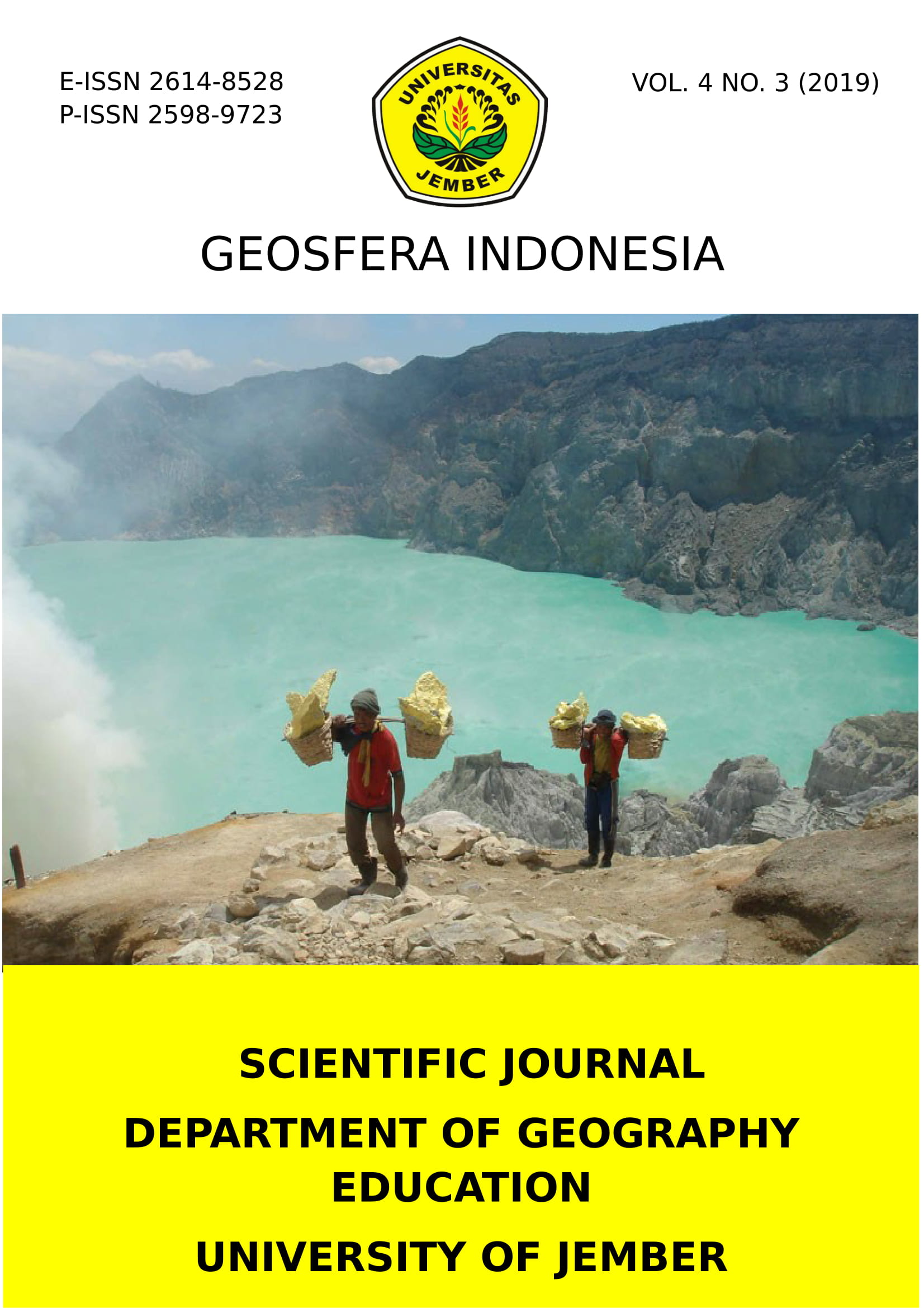Local Wisdom in Responding to Disaster of Merapi Eruption: Case Study of Wonolelo Village
DOI:
https://doi.org/10.19184/geosi.v4i3.14066Keywords:
Disaster, Local wisdom, Merapi volcanoAbstract
The people who live in the Merapi area have been going on for years. Merapi is the most active volcano in Central Java that can threaten the community, but the community still exists today, of course, having local wisdom in responding to the eruption of Merapi. This study aims to determine the local wisdom of Wonolelo Village before, during, and after the Merapi eruption. In addition, to find out the historical relationship of the Merapi eruption to local wisdom and the challenges faced by Wonolelo Village in maintaining the sustainability of local wisdom. This research was used as a descriptive qualitative method. The method of collecting data is done through observation, in-depth interviews, and documentation. Data sources of this study are community leaders, spiritual leaders, and people who are more than 70 years old. Analysis of the data used is sourced triangulation based on the Miles & Huberman model. The results showed that local wisdom in responding to the Merapi eruption in Wonolelo Village still exists today. Local wisdom is divided into three segments, namely before, during, and after the eruption of Merapi. Local wisdom before the Merapi eruption is a notification that Merapi eruption activity will occur. Local wisdom in Wonolelo Village has challenges in the form of modernization and not running the local wisdom relay to young people.
Keywords: Disaster, Local wisdom, Merapi volcano.
References
Andreastuti, S.D., Newhall, C., Dwiyanto, J. (2006). Menelusuri Kebenaran Letusan Gunung Merapi 1006. Jurnal Geologi Indonesia, Vol. 1, No. 4, Hal. 201-207.
Andreastuti, S., Paripurno, E., Gunawan, H., Budianto, A., Syahbana, D., & Pallister, J. (2019). Character of community response to volcanic crises at sinabung and kelud volcanoes. Journal of Volcanology and Geothermal Research, 382, 298-310. doi:10.1016/j.jvolgeores.2017.01.022
Atmojo, S. E., Rusilowati, A., Dwiningrum, S. I. A., & Skotnicka, M. (2018). The reconstruction of disaster knowledge through thematic learning of science, environment, technology, and society integrated with local wisdom. Jurnal Pendidikan IPA Indonesia, 7(2), 204-213. doi:10.15294/jpii.v7i2.14273
Bencana, B. N. P. (2010). Peraturan Kepala Badan Nasional Penanggulangan Bencana Nomor 17 Tahun 2010 Tentang Pedoman Umum Penyelenggaraan Rehabilitasi dan Rekonstruksi Pasca Bencana. Jakarta: BNPB.
Bencana, B. P. B. (2010). Badan Nasional Penanggulangan Daerah. Magelang: BPBD.
Geologi, BPPTK (2018). Badan Penyelidikan dan Pengembangan Teknologi Kebencanaan Geologi. Jakarta: BPPTKG
Geologi, BPPTK (2019). Badan Penyelidikan dan Pengembangan Teknologi Kebencanaan Geologi. Jakarta: BPPTKG
Bardintzeff, J.M. (1984). Merapi volcano (java, Indonesia) and merapi type nuee ardente. Bull volcanol, Vol. 47, No. 3, Hal. 432-446.
Boyolali, B. P. S. K. (2018). Kabupaten Boyolali dalam Angka. Boyolali : Badan Pusat Statistik
Cahyadi, A. (2013). Pengelolaan lingkungan zamrud khatulistiwa. Yogyakarta: Pintal.
Cho, S.E., Won, S., & Kim, S. (2016). Living in harmony with disaster: exploring volcanic hazard vulnerability in Indonesia. Sustainability, Vol. 8, Hlm. 1-13.
Daly, P. (2015). Embedded wisdom or rooted problems? aid workers' perspectives on local social and political infrastructure in post-tsunami aceh. Disasters, 39(2), 232-257. doi:10.1111/disa.12105
Dibyosaputro, S., Hadmoko, D.S., Cahyadi, A., & Nugraha, H. (2016). Gunung merapi: kebencanaan dan pengurangan risikonya. Yogyakarta: Badan Penerbit Fakultas Geografi (BPFG) Universitas Gadjah Mada.
Fatkhan, M. (2006). Kearifan lingkungan masyarakat lereng gunung merapi. Aplikasia, Jurnal Aplikasi Ilmu-ilmu Agama, Vol. 7, No. 2, Desember, Hal. 107-121.
Gertisser, R., Charbonnier, S.J., Keller, J., & Quidelleur, X. (2012). The geological evolution of Merapi vulcano, Central Java, Indonesia. Bull Volcanol, Vol. 74. Hal. 1213-1233.
Haba, J. (2008). Bencana alam dalam perspektif lokal dan perspektif kristiani. LIPI, Vol. 34, No. 1, Hal. 25-49.
Hardoyo, S.R., Marfai, M.A., Ni’mah, N.M., Mukti, R.Y., Zahro, Q., & Halim, A. (2011). Strategi adaptasi masyarakat terhadap bencana banjir rob di pekalongan. Yogyakarta: Magister Perencanaan Pengelolaan Pesisir dan Daerah Aliran Sungai, Cahaya Press.
Ikeda, S., & Nagasaka, T. (2011). An emergent framework of disaster risk governance towards innovating coping capability for reducing disaster risks in local communities. International Journal of Disaster Risk Science, 2(2) doi:10.1007/s13753-011-0006-7
Inaotombi, S., & Mahanta, P. C. (2019). Pathways of socio-ecological resilience to climate change for fisheries through indigenous knowledge. Human and Ecological Risk Assessment, 25(8), 2032-2044. doi:10.1080/10807039.2018.1482197
Klaten, B. P. S. K. (2018). Kabupaten Klaten dalam Angka. Klaten : Badan Pusat Statistik
Kusumasari, B., & Alam, Q. (2012). Local wisdom-based disaster recovery model in indonesia. Disaster Prevention and Management: An International Journal, 21(3), 351-369. doi:10.1108/09653561211234525
Lestari, P., Kusumayudha, S. B., Paripurno, E. T., & Jayadianti, H. (2016). Environmental communication model for disaster mitigation of mount sinabung eruption karo regency of north sumatra. Information (Japan), 19(9B), 4265-4270.
Magelang, B. P. S. K. (2018). Kabupaten Magelang dalam Angka. Boyolali : Badan Pusat Statistik
Marfai, M.A. (2011). Jakarta flood hazard and community participation on disaster preparedness. Prosiding dalam seminar Community preparedness and disaster management, center for religious and cross-cultural studies, UGMI, no. 2/2011 (december), Hlm, 209-221.
Marfai, M.A., & Hizbaron, D.R. (2011). Community’s adaptive capacity due to coastal flooding in semarang coastal city, Indonesia. International Journal of Seria Geografie, Annals of the Univeristy of Oradea. E-ISSN 2065-1619. Year XX.
Mulyaningsih, S., Sampurno, Zaim, Y., Puradimaja, D.J., Bronto, S., & Siregar, D.A. (2006). Perkembangan geologi pada kuwarter awal sampai masa sejarah di dataran yogyakarta. Jurnal Geologi Indonesia, Vol. 1, No. 2, Juni, Hal. 103-113.
Permana, S. A., Setyowati, D. L., Slamet, A., & Juhadi. (2017). Society management in manage economic after merapi disaster. International Journal of Applied Business and Economic Research, 15(7), 1-10
Preece, K., Gertisser, R., Barclay, J., Berlo, K., Herd, R.A., & Facility, E.I.M. (2014). Pre and syneruptive degassing and crystallisation processes of the 2010 and 2006 eruptions of merapi volcano, indonesia. Contrib Mineral Petrol, Vol. 168: No. 1061, Hal. 1-25, DOI 10.1007/s00410-014-1061-z.
Ridwan, N.A. (2007). Landasan keilmuan kearifan lokal. Jurnal study islam dan budaya, Vol. 5, No. 1. Hlm. 27-38.
Rokib, M. (2013). Teologi Bencana: Studi Santri Tanggap Bencana. Yogyakarta: Buku Pintal.
Sawangan, B. P. S. K. (2018). Kecamatan Sawangan dalam Angka. Sawangan : Badan Pusat Statistik
Setiawan, B., Innatesari, D. K., Sabtiawan, W. B., & Sudarmin, S. (2017). The development of local wisdom-based natural science module to improve science literation of students. Jurnal Pendidikan IPA Indonesia, 6(1), 49-54. doi:10.15294/jpii.v6i1.9595
Sibarani, R. (2013). Pembentukan karakter berbasis kearifan lokal. Online, http://www.museum.pusaka.nias.org/2013/02/pembentukan-karakter-berbasis-kearifan.html. Diunduh tanggal 10 october 2019.
Sleman, B. P. S. K. (2018). Kabupaten Sleman dalam Angka. Sleman : Badan Pusat Statistik
Syahputra, H. (2019). Indigenous knowledge representation in mitigation process: A study of communities’ understandings of natural disasters in aceh province, indonesia. Collection and Curation, 38(4), 94-102. doi:10.1108/CC-11-2017-0046
Voight, B., Constantine, E.K., Siswowidjoyo, S., & Torley, R. (2000). Historical eruptions of merapi vulcano, Central Java, Indonesia, 1768-1998. Journal of Volcanology and Geothermal Research, Vol. 100, Hal. 69–138.
Wilson, T.; Kaye, G., Stewart, C. and Cole, J. (2007). Impacts of the 2006 eruption of merapi volcano, Indonesia, on agriculture and infrastructure. GNS Science Report, 2007/07 Hal. 1-69.
Copyright (c) 2019 Geosfera Indonesia Journal and Department of Geography Education, University of Jember

This work is licensed under a Creative Commons Attribution-Share A like 4.0 International License



